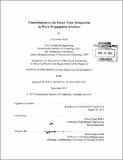Contributions to the direct time integration in wave propagation analyses
Author(s)
Noh, Gunwoo
DownloadFull printable version (12.69Mb)
Other Contributors
Massachusetts Institute of Technology. Department of Mechanical Engineering.
Advisor
Klaus-Jürgen Bathe.
Terms of use
Metadata
Show full item recordAbstract
This thesis intends to contribute to the computational methods for wave propagations. We review an implicit time integration method, the Bathe method, that remains stable without the use of adjustable parameters when the commonly used trapezoidal rule results in unstable solutions. We then focus on additional important attributes of the scheme. We present dispersion properties of the Bathe method and show that its desired characteristics for structural dynamics are also valuable for wave propagation problems. A dispersion analysis using the CFL number is given and the solution of some benchmark problems show that the scheme is a method for general use for structural dynamics and wave propagations. Finally, we propose a new explicit time integration method for the analysis of wave propagation problems. The scheme has been formulated using a sub-step within a time step to achieve desired numerical damping to suppress undesirable spurious oscillations of high frequencies. With the optimal CFL number, the method uses about 10% more solution effort as the standard central difference scheme but significantly improves the solution accuracy and a non-diagonal damping matrix can directly be included. The stability, accuracy and numerical dispersion are analyzed, and solutions to problems are given that illustrate the performance of the scheme. Keywords Direct time integrations, Structural dynamics, Wave propagations, Numerical damping, Numerical dispersion.
Description
Thesis: Ph. D., Massachusetts Institute of Technology, Department of Mechanical Engineering, 2013. Cataloged from PDF version of thesis. Includes bibliographical references (pages 115-119).
Date issued
2013Department
Massachusetts Institute of Technology. Department of Mechanical EngineeringPublisher
Massachusetts Institute of Technology
Keywords
Mechanical Engineering.